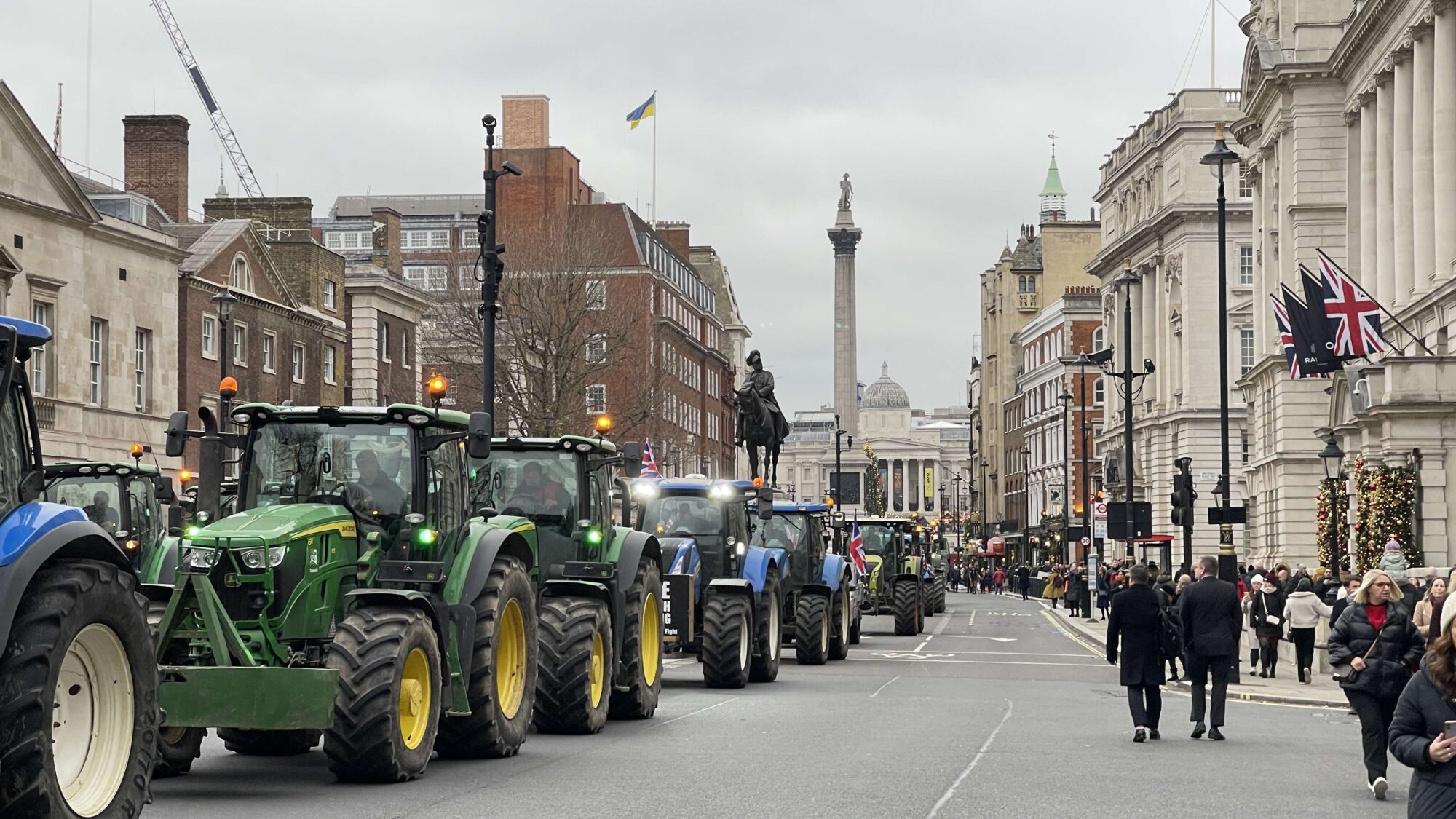
Photo: Nick Hallett
Hundreds of farmers rallied in central London on Wednesday, voicing their opposition to Labour’s planned changes to inheritance tax, which threaten the survival of family farms. A convoy of tractors, many adorned with Union flags and placards reading “No farmers, no food” and “Save British Farming,” filled the streets around Parliament Square in a loud and defiant demonstration.
The protest, organised by Kent Fairness for Farmers and Save British Farming, highlighted widespread discontent with the policy, which imposes a 20% inheritance tax on agricultural assets valued over £1 million starting in 2026. Farmers claim the tax burdens an industry already struggling with slim margins and rising costs.
This protest followed a similar demonstration last month, where farmers first voiced their anger against the inheritance tax changes. Nigel Farage, leader of Reform UK, joined the protest and, speaking to The Telegraph, urged farmers to maintain pressure on the government. “In the 100 rural constituencies Labour now holds, they have to keep up this pressure. It has to be persistent in every market town,” he said. Addressing the government directly, Farage warned: “Wake up and smell the coffee. You are going to lose all the seats in those rural areas if you don’t change the rules.”
Farmers like Martin and Joe Brandreth exemplified the protest’s grassroots nature, driving six hours from Warwickshire to participate. The Brandreths, third-generation dairy and arable farmers, decorated their tractors with festive lights and banners proclaiming, “British Farming – Keir Today, Gone Tomorrow.” Martin Brandreth noted the public’s strong support, telling The Telegraph, “The general public’s response has been immense. The amount of people saying ‘we’re backing you’ is encouraging. We just hope the people up top listen.”
The inheritance tax changes have sparked emotional responses from farming leaders. National Farmers’ Union (NFU) President Tom Bradshaw broke down in tears during a parliamentary hearing happening at the same time as the protest, describing the mental health toll on elderly and ill farmers who fear losing their lifelong work. “It’s not about money,” he said. “This is a lifetime of work, it’s the heritage and custodianship of their farm.” Bradshaw warned that some farmers may feel compelled to take drastic actions to protect their estates.
Matt Cullen, a beef farmer and organiser with Kent Fairness for Farmers, called the protest a “war” and vowed to force the government into a U-turn. “The time has now come for farmers to unite and stand up and fight back,” he declared. Cullen also hinted at potential escalations, urging protesters to go “hell for leather” with their air horns and lights.
Liz Webster, founder of Save British Farming, suggested farmers could cut off food supplies in the new year if the government remains unyielding. “We want the country to wake up to what the government is doing. If we rely on imported food, you will be looking to pay a lot more for lower quality food,” she warned.
Speaking during Prime Minister’s Questions on Wednesday, critics of the tax reforms, such as Conservative MP Jerome Mayhew, accused the government of betrayal. “Many farmers in my constituency now believe the prime minister and his government are duplicitous,” he said. Sir Ed Davey, leader of the Liberal Democrats, echoed these concerns, calling the changes the “final blow” for struggling farmers.
Prime Minister Keir Starmer defended the policy, claiming that the vast majority of farmers would not be affected due to the £3 million threshold for paying the tax. However, the NFU disputes this, arguing that three-quarters of commercial family farms would face the tax, potentially leading to the sale of significant portions of farmland.
Farmers like Jeff Gibson and David Catt warned of the protest movement’s potential to escalate. “This is a warning shot,” Gibson told The Times. “If the financial issue is not addressed, it would be the easiest thing in the world for farmers to bring this country to an absolute standstill.”
As tractors blared their horns to the tune of “The Final Countdown,” the demonstrators’ message was clear: the government’s inheritance tax reforms are an existential threat to British farming. Whether the government will budge remains uncertain, but the farmers’ determination to fight on is unwavering.
